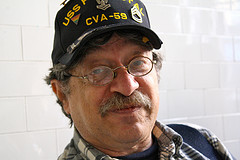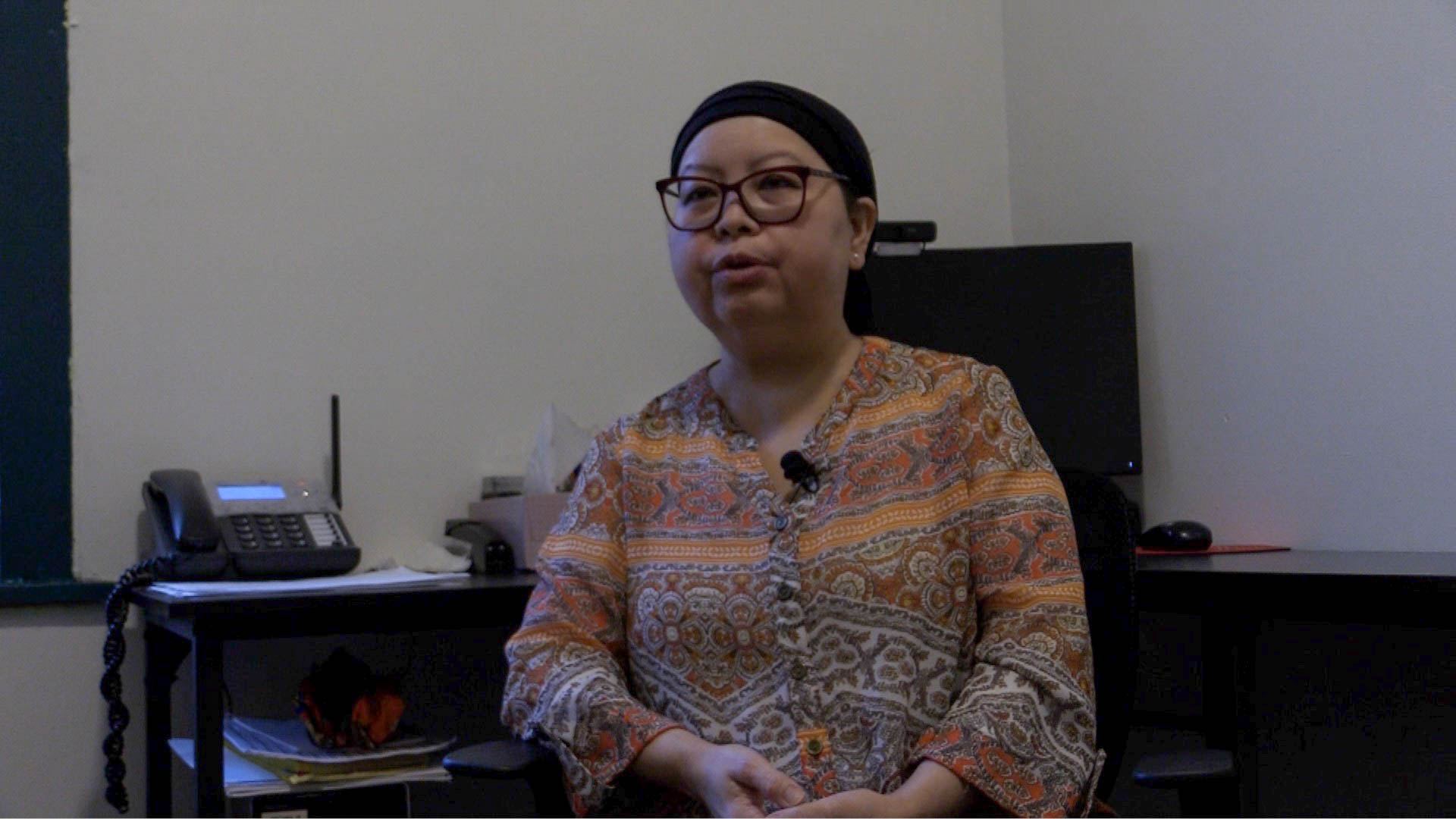
In a converted bathroom in the West Village, Manhattan LGBT Community Center, gay veterans gather for the first meeting of AVER, American Veterans for Equal Rights, since the repeal of the military's Don't Ask, Don't Tell policy. Photo by Meredith Bennett-Smith
Every time former Marine Sgt. John Ball Jr. walks past an American flag, sees the Marine Corps eagle and anchor and reads a Marine Corps bumper sticker, he feels the tug of the corps calling him back.
“I miss the feeling, I miss being a Marine, and I miss helping people,” Ball said.
It is a call that Ball, a gay veteran, is forced to ignore for now. Despite December’s highly publicized congressional repeal of the U.S. military’s Don’t Ask, Don’t Tell, a policy banning gay and lesbian service members from serving openly, details of the finalized repeal and when it will go into effect remain speculative. Until the Pentagon certifies that all military branches have completed a plan of implementation, openly gay and lesbian service members are still subject to court-martial and discharge.
Ball joined the Marines straight out of high school. As an 18-year-old, he was still trying to figure out his sexuality.
What he was certain of was his patriotism. After he received an honorable discharge in 2003, Ball considered re-enlisting. But he decided against it; after four years of hiding, enough was enough.
“Don’t Ask, Don’t Tell was the main and only reason [I left],” Ball said. “I [couldn’t tolerate] the lies, the lies that I told to my friends and to my chain of command. You pretty much live a double life.”
Since then, Ball worked as a contractor in Afghanistan and now lives in Limerick, Pa. He’s started the re-enlistment process on several occasions but backed out each time, fearing discovery and the consequent stigma of a dishonorable discharge.
The repeal of Don’t Ask Don’t Tell has breathed new life into his hope of one day returning to active duty. Still, Ball said he is not naïve.
“[After the repeal] I got excited,” he said. “I had a little celebration. But it’s still not legal. I’m going to give it six months.”
This state of cautious optimism is common among veterans and activists alike.

Denny Meyer, Vice President for Region I of American Veterans for Equal Rights, an LGBT Veterans Association. Photo by Meredith Bennett-Smith
“It’s not over,” said Denny Meyer, Vice President of Region I for American Veterans for Equal Rights (AVER).
In a white-tiled bathroom on the second floor of the LGBT Community Center on 13th Street near 7th Avenue, Meyer, a colorful gay activist and veteran of both the U.S. Navy and Army, presided over the first New York chapter meeting of AVER this year—or, as Meyer called it, “the first meeting of AVER in the new era.”
For grassroots advocates like Meyer, the change has been a long-time coming. It was nearly 30 years ago that Meyer, a New York native from Kew Gardens, Queens, left the Army as a Sergeant First Class. After a decade of service, Meyer found himself unable to remain closeted.
Until President Obama and Joint Chiefs of Staff Chairman Admiral Mullen sign off on an official plan, the repeal will remain merely a symbolic victory for the AVER veterans.
The nuances of any final plan will have important implications both for older veterans such as Meyer, who has long since hung up his combat boots, for younger vets like Ball Jr., who at 30 can still rejoin the Corps., and for those gay and lesbians currently serving.
Meyer struck an optimistic tone not necessarily shared by all.
“Supposedly [the repeal] may happen by summer, which by military standards is lightening speed,” Meyer said. “There’s a lot of pressure and commitment to get it done by summer. I’d like to see it, but I’m not so sure they can get it all done and certified [by then].”
On Feb. 11 the Pentagon finalized the four benchmarks that will be used to gauge each military branches’ compliance with the repeal: the pre-repeal step, implementation of the repeal, a certificate confirming Don’t Ask, Don’t Tell is no longer in effect and documented proof of a sustained implementation of the repeal.
The military must also complete a three-tiered “retraining” process, starting with senior personnel and working down through the ranks. A repeal implementation team will begin sending regular updates to President Obama, Secretary of Defense Robert Gates and Admiral Mullen on March 1.
Under the new, as of yet unimplemented policy, harassment or abuse based on sexual discrimination will be unacceptable, Meyer read from the DOD’s most recent release. The statement drew muffled snorts of skepticism from the small gathering.
“Now listen,” Meyer said, “the Pentagon isn’t stupid. They did think of all this. They don’t want riots; they had those already in the 1950s. And they don’t want people getting sexually harassed because they had those all through the 90s and now when women were integrated.”
Denny Meyer on what he said he would do if DADT was ever repealed.
Besides its pledge of nondiscrimination, openly gay service members will be able to designate to whom their life insurance policy falls. Although technically open to gays in the past, under Don’t Ask, Don’t Tell, “a gay service member wouldn’t dare put down John Schmidt, their lover because there’s no privacy,” Meyer said. “That piece of paper goes to the clerk, it goes to the Commanding Officer, and he goes, ‘What are you a fag? Who is this?’ Now you don’t have to worry.”
Gay and lesbian veterans would also have access to Vietnam War benefits where applicable, death benefits, and be able to designate a gay or lesbian partner as their caregiver. But because of the Defense of Marriage Act, which still remains in effect, spousal rights proffered to heterosexual couples will remain out of reach. There will also be no compensation for those already drummed out.
The repeal’s current bureaucratic stage is perhaps most poignant for those gay and lesbian service members currently serving. In December, a chance at honesty seemed closer than ever, but some feel close isn’t good enough when careers hang in the balance.
After his graduation from the Naval Academy in Annapolis, Harvey Smith, whose name has been changed to protect his identity, rose quickly through the ranks. Today the sailor is a lieutenant commander, one rank below the commander of naval vessels.
Smith said he thought Don’t Ask, Don’t Tell would be repealed eventually, but he did not anticipate it to happen while he was still serving. Smith added he didn’t expect there to be a problem if and when he officially comes out.
“I think it will be easy to come out so long as it doesn’t affect my work, which I don’t anticipate,” Smith said. “I think it’ll be a convenience rather than a need.”
Yet Smith’s stripes have a lot to do with his comfort level. As a ranking O4 Senior Officer, fewer questions have been leveled about his sexual preferences.
“Based on my experience,” he said, “and I say that to emphasize others’ may differ, officers generally tend to be more accepting.”
Smith considers himself a successful naval officer with the respect of subordinates and superiors alike. He said doesn’t want any special treatment. He simply wants the charade to end.
“Don’t Ask, Don’t Tell essentially forces my partner and me to maintain a level of separation that straight relationships would never have to endure,” Smith said. “Everything from security clearances to transition schedules to vacation photos become challenges as I try to keep my partner part of my life though under the Navy radar,” Smith said. “Repeal would not mean he could be a full-fledged spouse in the eyes of the Navy, but at least he doesn’t have to be invisible.”

Comments
YOU GO GIRL! Another great piece.